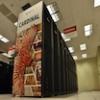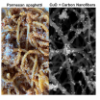Panya Bhinder’s love for science and technology began as a high school student at Columbus Academy, where physics and its processes captivated her. Like many high school students, she was unsure of how to translate her interests into a potential career.
Press Releases
Primary tabs
The Global Open OnDemand (GOOD) conference attracted 170 attendees from 10 countries during its inaugural event March 17-20, 2025, at Harvard University in Cambridge, Massachusetts. More than 50 high performance computing (HPC) professionals, developers and researchers gave talks about how they have used and adapted the Ohio Supercomputer Center’s (OSC) Open OnDemand web portal to advance research computing at their institutions.
Artificial intelligence (AI) has revolutionized numerous industries, yet its transformative power often remains out of reach for those outside specialized fields. Farmers, for example, face challenges in harnessing advanced tools that could streamline operations and solve critical issues.
The Ohio Supercomputer Center’s (OSC) newest research computing cluster, Cardinal, has been ranked No. 15 on the Green500 list, which ranks the top energy-efficient high performance computing (HPC) systems around the globe.
The Global Open OnDemand (GOOD) conference will feature more than 50 talks, tutorials, posters and birds-of-a-feather discussions about the use and impact of the Ohio Supercomputer Center’s (OSC) popular web portal, Open OnDemand, on high performance computing (HPC) centers.
In spring 2022, Michigan State University (MSU) received a grant from the National Science Foundation (NSF) to develop the Data Machine, a new research computing resource that could accommodate the analysis of large data sets, as well as artificial intelligence (AI) and machine learning work.
The Ohio Supercomputer Center (OSC) has released version 4.0 of Open OnDemand, a web-based client portal used by high performance computing (HPC) centers around the globe, to offer clients new ways to customize and manage their work.
Anju R. Gupta's Interfacial Thermal and Transport Laboratory (ITTL) is driven by a passion for translating nature-inspired concepts into practical applications. The lab at the University of Toledo focuses on the interfacial engineering of both soft and hard materials, exploring thermally driven processes that involve heat transfer mechanisms and multiphase flows.
In 2024, Ohio Supercomputer Center (OSC) staff connected with the national research computing community at four major conferences, fostering collaboration between academic researchers and industry leaders to drive advancements in high performance computing (HPC).








